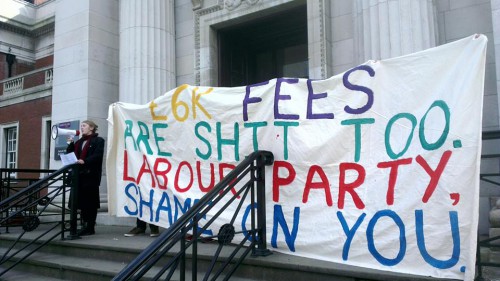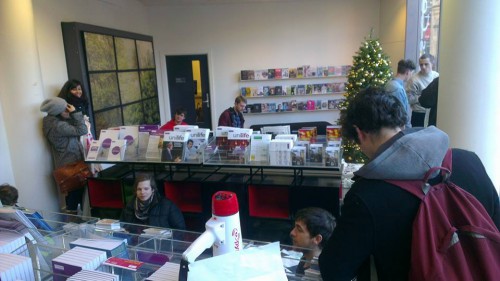‘The Enemy is Profit’: The Free Education Movement
Article published: Wednesday, March 25th 2015
Student activist group Free Education MCR encourage debate about the possibility of a ‘free, liberated and democratic education’. In response to the Labour Party’s recent pledge to reduce tuition fees to £6000 a year, students gathered on the steps of the University of Manchester’s Samuel Alexander Building last week for an open mic session to discuss why they should be rejecting this policy and fighting instead for free education.
The student movement has seen a recent resurgence, with the national march for free education last November drawing 10,000 protestors to the streets of Central London – the largest student demonstration since 2010. But the movement has evolved over the past four years. While the mass mobilisations of 2010 were primarily defensive, as students reacted to the government’s trebling of tuition fees, the recent wave of campus activism has taken a more affirmative form. Students fighting for free education are no longer simply calling for a reversal of government policy, but a total restructuring of the education system.
Following on from the national demonstration, Free Education MCR took action in December to kickstart the local movement. The action, which began with an assembly outside the University of Manchester Library before ending with an occupation of the university’s Visitors Centre, came as campuses across the country mobilised to fight back against the marketisation of higher education.
“One of the things that’s really remarkable about this movement is that there isn’t a direct impetus, there isn’t something which is going out and actively mobilising people”, said Fred from Free Education MCR, referring to the progression of the student movement over the past few years. “It’s not a reactionary movement anymore. This is a movement about ideals and the way that we think society should be run.”
The statement that lead the students’ list of demands – ‘Today we are taking action against the neoliberal university’ – demonstrated the group’s intention to situate their fightback within a wider critique of an education system increasingly dominated by the market. “People are paying £9000 fees, but it’s also all the changes that came alongside that which are more complicated and actually much more dangerous”, said Luke, one of the students who lead the occupation of the Visitors Centre. “Increasingly, the university is acting as if it were a corporation.” The immediate effects of this transformation are being held up by the activists as evidence that the market is failing to meet the needs of students: the University of Manchester is implementing £3,000,000 worth of cuts to bursaries by 2016, while rent prices for student accommodation have risen by 63 per cent over the past ten years.
But, according to the free education activists, the effects of marketisation go beyond the economics. As students are increasingly encouraged to treat their education as a commodity, conceptions about the purpose of education start shifting. Hannah, a student of Sociology and Social Anthropology, was critical of how these changing attitudes are affecting her studies: “A lot of our lectures now are orientated towards us getting a graduate job”, she said. “It’s like the corporatisation of a subject which is essentially social.” In her view, allowing the value of education to be dictated by the market inevitably has a detrimental effect on the experience that the university offers: “Education isn’t really treated as an end in itself anymore, it’s no longer about the expansion of your mind but just about getting a job.”
The site of the occupation was chosen to show the students’ anti-corporate position. They temporarily took over the Visitors Centre to symbolically reclaiming the space in which the university most prominently markets its brand image.
The movement has strengthened as students have begun to build solidarity and join wider struggles. With activists also campaigning for the university to become an accredited Living Wage employer, calling for the institution to divest from the fossil fuel industry and supporting striking lecturers on the picket line, it is clear that, for this movement, a free education means much more than the abolition of fees. Students are calling for a more democratic culture in the university, one that is not “dominated by white, middle-class men”, as Hannah put it. “It’s about opening up universities to be free and to represent the population.”
Inspired by the success of student movements in Quebec and Germany, students are hoping that by extending their argument beyond the issue of tuition fees and reaching out to wider sections of society, they can gain support. “I actually think us being here is a sign of the beginning of a sustained movement”, said Luke, as the activists made their mark on the Visitors Centre, hanging banners from the windows and attracting the attention of passing students. “We want to build a serious movement. We want to link up with workers in the university to build a better university.”
The group have been keeping up the pressure since the occupation with events such as a ‘Payday Party’ for Dame Nancy Rothwell, the Vice-Chancellor of the University of Manchester, on 19th January. The event aimed to shine the spotlight on pay inequality on campus, marking the day that the Vice-Challencor’s income had already reached the annual earnings of the university’s lowest paid worker. In response to this disparity, demonstrators called for the university to put a 5:1 pay ratio in place, work towards closing gender and racial pay gaps, and create a democratic system, giving workers and students control over pay.
More actions are being planned for the coming months, with activists hoping to build on the movement’s recent surge in momentum. Students from across the country were able to discuss, plan and vote on long-term strategies at the National Campaign Against Fees and Cuts conference held in Manchester in December. Outcomes of the event included plans to call a day of action targeting the depoliticisation of the student union, calls to organise more local marches this year and the intention to build towards a national student strike in 2016. With the promise of larger, more sustained and more radical action in the near future, the reinvigoration of the student movement seems set to continue.
Michael Crick
More: Education, Manchester, News, QuickKick
Comments
-
[…] under occupation since last Wednesday when around 30 students, acting as part of the campaign group Free Education MCR, barricaded themselves in to the business school building, refusing to leave until the […]
Pingback by » Students end occupation to join wider anti-austerity protest - MULE on May 23, 2015 at 12:29 pm
The comments are closed.





